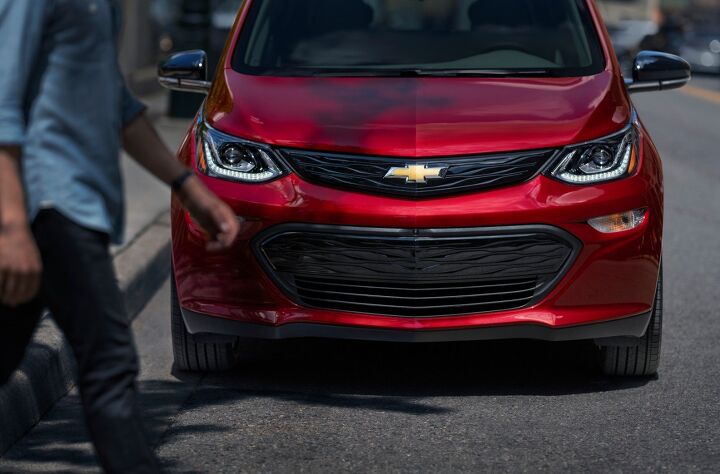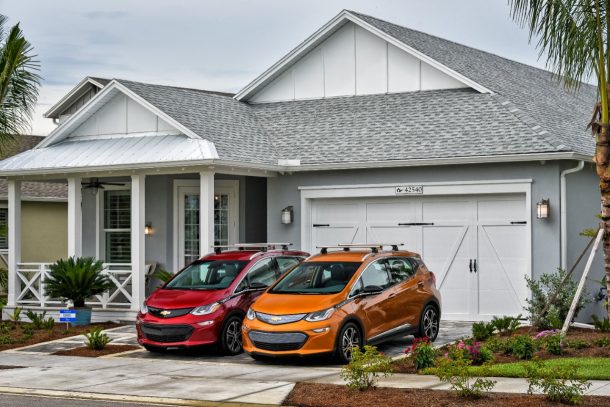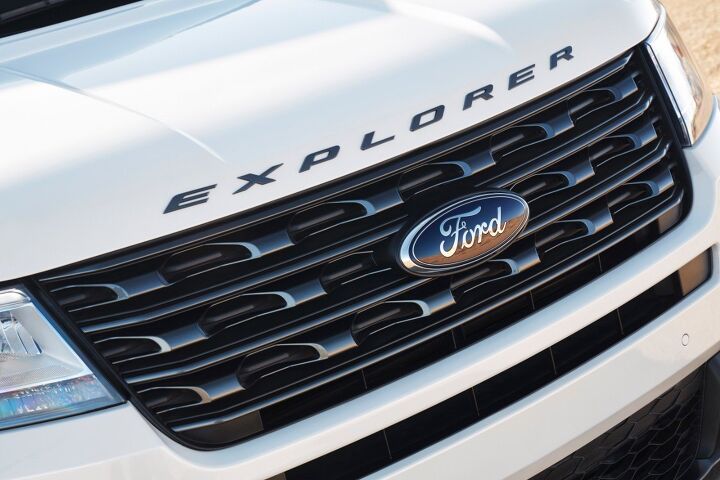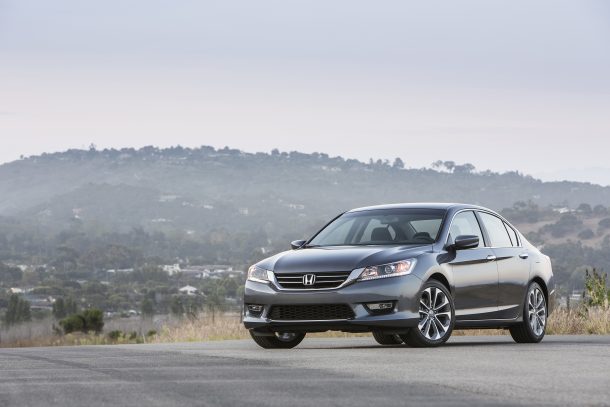#NHTSA
Chevy Bolt Fire Fix Allegedly Finalized
The Chevrolet Bolt has evolved from being General Motors’ superstar EV, radiating optimism for the company’s ambitious electrification strategy, to a public relations nightmare in relatively short order. While sales of the hatchback (and EUV) actually skyrocketed in Q2 of 2021, thanks largely to a diminished production output from the same period in 2020, shoppers are becoming aware of the fire reports and prolonged recall campaign that followed.
Another chapter has been added to that story, with GM now convinced that this will be the conclusion of the dejected tale. On Monday, the manufacturer issued an announcement that batteries for the Bolt had resumed production. But they won’t be coming out of the South Korean facility owned by LG Chem that’s been alleged as ground zero for the relevant defects. GM has instead elected to source the units from Michigan while LG improves quality assurance with the automaker peering over its shoulder, hopeful that customers will someday be able to use their car normally. Sadly, that moment still looks to be several months away.
Twist: NHTSA Tesla Autopilot Probe Now Includes Other Automakers
The National Highway Traffic Safety Administration (NHTSA) has been doing a deep dive into Tesla’s Autopilot to determine if 765,000 vehicles from the 2014 model year onward are fit to be on the road. We’ve covered it on numerous occasions, with your author often making a plea for regulators not to harp on one company when the entire industry has been slinging advanced driving aids and distracting infotainment displays for years.
Apparently someone at the NHTSA either heard the blathering, or was at least of a similar mind, because the organization has expanded its investigation to include roughly a dozen other automakers.
NHTSA Identifies 12th Autopilot Related Crash Involving Emergency Vehicles
The U.S. National Highway Traffic Safety Administration (NHTSA) has identified another traffic incident pertaining to Tesla’s driver assistance features and emergency vehicles, making the current tally twelve. These wrecks have been a matter of focus for the agency ever since it opened a probe to determine whether or not Autopilot can handle hiccups in the road caused by scenes where flares, cones, disabled automobiles, and first responders coalesce.
Though concerns remain that Tesla is being singled out unjustly when there’s little evidence to suggest that other manufacturers are providing more capable systems. Tesla’s issues appear to be heavily influenced by irresponsible marketing that makes it seem as though its vehicles are self-driving when no manufacturer can make that claim. U.S. regulators now want to place more restrictions on vehicles boasting autonomous features and, thus far, Tesla has been behind on those trends. But it’s hard to support claims that they make vehicles safer when none seem as effective as they should be.
Ram Recall Encompasses 212,000 Pickups
Stellantis is recalling 212,373 Ram vehicles over issues relating to the side-mounted airbag inflators. Relevant safety reports were filed with the National Highway Traffic Safety Administration earlier in the month and describe circumstances somewhat similar to the nightmare that preceded the Takata airbag recall. Inflator components exposed to moisture may have a tendency to lose components or outright rupture, potentially spraying the interior with metal fragments.
The Ram inflators are believed to have been exposed to unnecessary levels of moisture during the manufacturing process, resulting in a weakening of the materials under pressure. FCA US (which is the name used on the NHTSA report, rather than the global Stellantis) started an investigation in December of 2020 after it had determined some pickups had been installed with side-curtain airbags with defective inflators. The company traced the issue all the way back to the 2015 model year.
NHTSA Considers Increasing Fines for Emission Violations
The National Highway Traffic Safety Administration is considering increasing penalties for automakers that fail to meet fuel-efficiency requirements. Though this could be considered a restoration of older standards, depending upon your perspective.
Shortly before leaving office, President Donald Trump postponed a regulation from the last days of the Obama administration that would have effectively doubled fines for vehicle manufacturers failing to meet Corporate Average Fuel Economy (CAFE) requirements. Automakers had been complaining that the rule would have dramatically increased operating costs, suggesting that would trickle down to vehicle pricing and give manufacturers selling carbon credits an unfair advantage.
NHTSA Resumes Inquisition of Tesla Autopilot
The National Highway Traffic Safety Administration (NHTSA) has been keeping tabs on Tesla’s Autopilot for years, sometimes giving crashes involving the system a bit more attention than they otherwise would have. But the extra scrutiny seemed to dissipate as practically every automaker on the planet introduced their own advanced driving suites and Telsa seemed to preemptively adhere to fast-approaching government regulations (and industry norm) by introducing driver-monitoring cameras.
On Friday, the NHTSA returned to business as usual and announced it had opened a preliminary evaluation of Autopilot to determine if there were any problems with the system. The agency has claimed it received at least 11 verifiable crash reports since 2018 where a Tesla product struck at least one vehicle that was already at the scene of an accident. It’s sort of a weird metric but allegedly worthy of the NHTSA wanting to look into every model the company produced between 2014 and 2021. However, actually reading the report makes it sound like the agency is more preoccupied with how Tesla’s system engaged with drivers, rather than establishing the true effectiveness of Autopilot as a system.
VW Issues Stop Sale Order on Taos
If you’ve set sights on driving home a new Volkswagen Taos today, best cool your jets. According to a report by Automotive News, the model is under a stop-sale order by the National Highway Traffic Safety Administration.
Well, all-wheel-drive models are, anyway.
NHTSA Cautions Against Leaving Chevrolet Bolt EVs Indoors
The National Highway Traffic Safety Administration (NHTSA) has issued an alert pertaining to Chevrolet Bolt owners, as the vehicles’ LG Chem battery packs could have a propensity to catch fire. On Wednesday, the safety organization recommended that the cars be left outdoors (ideally a healthy distance from anything flammable) and never left unattended while charging.
This defeats one of the largest perks of owning an electric vehicle (at-home charging), as customers will be required to buy extra-long cables and monitor their car outdoors for hours as it takes on energy. Owning a horse would be less work.
IIHS Claims Marijuana Legalization Causes Crashes
It’s always nice to get a break from the endless stream of industry marketing materials about electrification, though this week’s impromptu theme still involves going green. Following news that General Motors is considering changing its drug testing policies to exclude marijuana, there has been heavy coverage of an Insurance Institute for Highway Safety (IIHS) study claiming states that have legalized recreational use of cannabis are seeing more crashes.
But the framing seems wildly irresponsible as it fails to highlight the problem being heavily tied to individuals operating a vehicle under the influence of marijuana and alcohol combined. It’s more or less what the IIHS attempted to do in 2018 with help from the Highway Loss Data Institute (HLDI). Our guess is that the duo is seeking out fresh reasons for insurance companies to raise rates in regions that have legalized pot because even their own research complicates the issue.
Safety Groups Downgrade Tesla Models for Dumping Radar
The National Highway Traffic Safety Administration is downgrading the Tesla Model 3 and Y following the company’s decision to remove radar from its advanced driver-assistance suite. We wrote about it, noting that the change actually removed several features from the affected cars and introduced the activation of another creepy, driving-monitoring camera.
While the latter aspect warranted the most cursing from your author’s side of the laptop, it’s the former that’s seeing the lion’s share of debate among groups advocating for vehicular safety. Everyone wants to blame Tesla’s overreliance on cameras as the thing contributing to high-profile crashes when there’s nary a vehicle on this planet that’s truly capable of driving itself. But that hasn’t stopped the NHTSA from slapping affected Tesla models into their own category, noting that they lack several functions it deemed important for safety. It’s all relative, considering there are millions of vehicles on the road that don’t have any advanced driving aids to speak of and heaps of evidence that electronic nannies don’t always function as intended. But it’s earning Tesla bad publicity as it gets dinged by increasingly more safety groups.
Pedestrian Deaths Ballooned Against Miles Driven Last Year
The Governors Highway Safety Association (GHSA) released the latest data pertaining to U.S. pedestrian fatalities — indicating that the largest-ever annual increase since we started keeping track in 1975. While the data is preliminary, the association estimated there were 6,721 pedestrian deaths in 2020. It’s a 4.8 percent increase over 2019 and not all that impressive until you realize most people basically gave up their normal driving routine during lockdowns. According to the GHSA, adjusting for miles driven actually results in an annual increase of 21 percent.
It’s genuinely creepy and kind of perplexing with everyone staying isolated. But we’re not going to recommend you start wearing high visibility jackets whenever you leave your home because the mathematical likelihood of being crushed by an automobile remains incredibly low.
Hyundai Motor Group Is on Fire: Kia Recalls Optima, Sorento Models
Despite Kia’s obvious efforts to transform its lineup into a slew of handsome models offering more of what drivers want, it continues to have trouble with some of them catching fire. That’s likely going to be a deal-breaker for many shoppers, especially with the latest recall suggesting flames could spring up after vehicles have been turned off.
Hyundai Motor Group (which owns Kia) is requesting 440,370 examples of the Optima and Sorento be returned to dealers over a potential brake fluid leak that may damage the hydraulic electronic control unit (HECU) and start a fire. The notice comes just weeks after Hyundai asked to see 125,800 automobiles (Kona, Veloster, Elantra) and Kia wanted to check on 147,000 (Seltos, Soul) models for the same issue.
Ford Recalling 661,000 Explorer SUVs for Real This Time
Ford Motor Co. is recalling over 660,000 2016-2019 model year Explorer sport utility vehicles over the suspect roof rails the company initially claimed were probably fine. The National Highway Traffic Safety Administration got involved last year, following a string of complaints of the rail cover loosening and sometimes being jettisoned from the vehicle, and recommended the automaker bring them in for repairs.
But Blue Oval felt that was unnecessary, claiming the odds of one decoupling were extremely low and likely to be battened down before anything happens. Besides, they’re just fiddly little pieces of trim and unlikely to do much damage. Obviously, opinions have changed since then with documentation from the NHTSA confirming Ford is moving ahead with the mostly voluntary recall.
2013-15 Honda Accords Heading in the Wrong Direction
2013-15 Honda Accords are under investigation by The National Highway Traffic Safety Administration (NHTSA) for a steering issue. Allegations of Accords suddenly losing control without warning have led to 107 complaints. According to a Motor1 report, there are as many as 1,120,470 Accords in the US that could be affected.
Kia 2021 Seltos and 2020-21 Soul Are Flaming Hot
Kia has recalled 2021 Seltos SUVs and 2020-21 Soul wagons with 2.0-liter, four-cylinder engines. 147,249 vehicles are involved. Inconsistent piston ring heat treating may cause engine damage. This can lead to a loss of power, and an increased risk of fires or crashing.




























Recent Comments